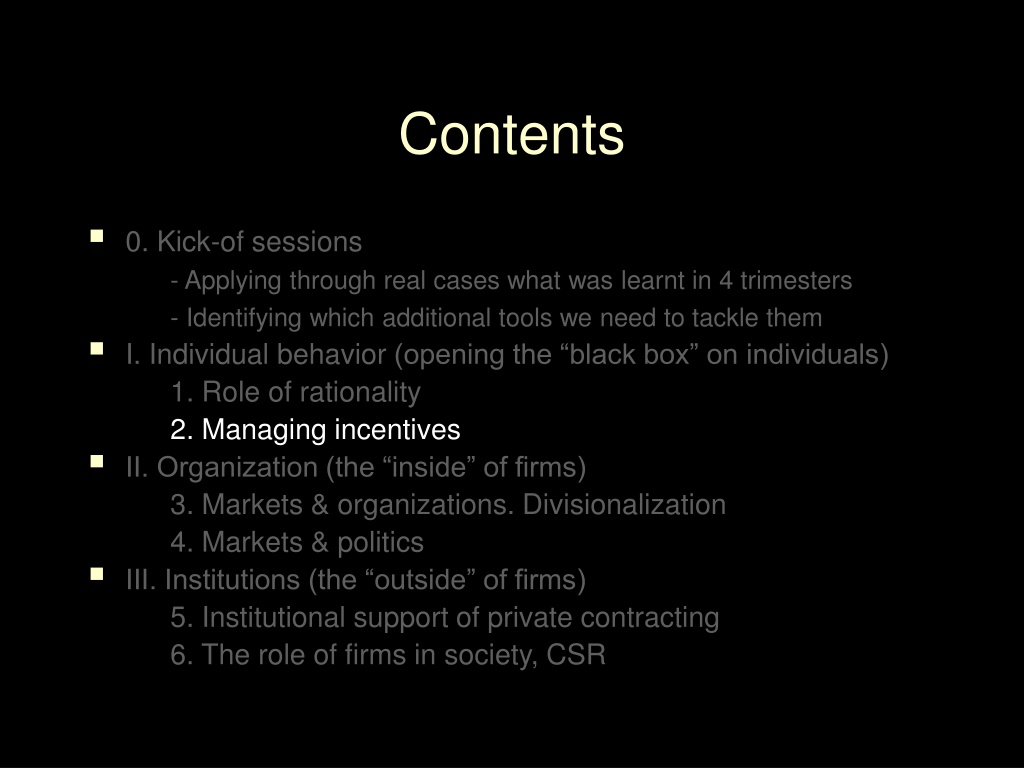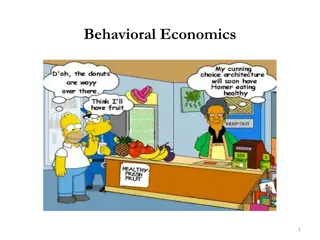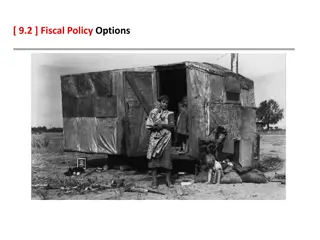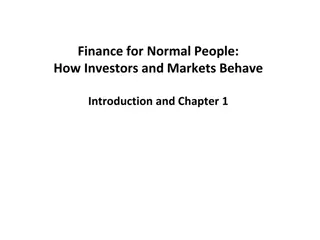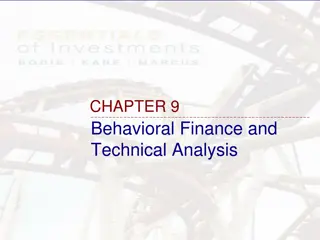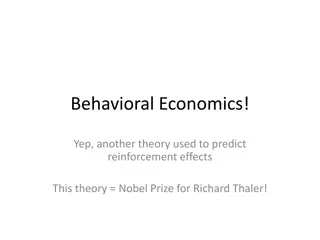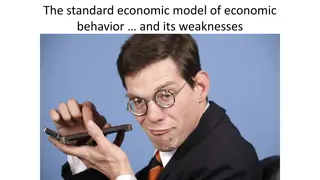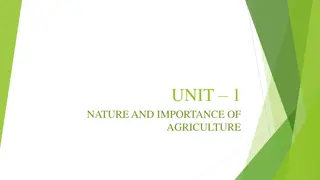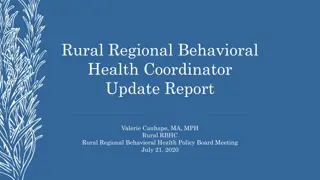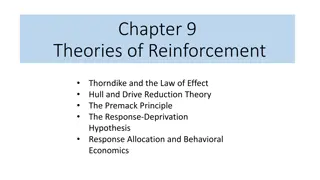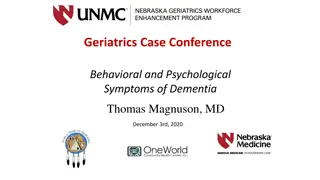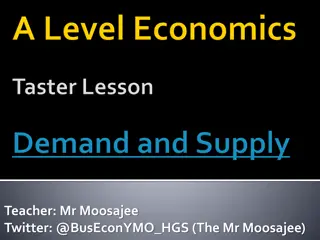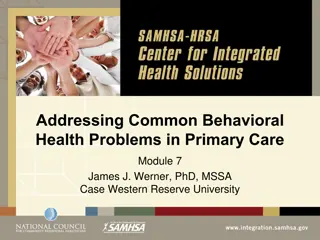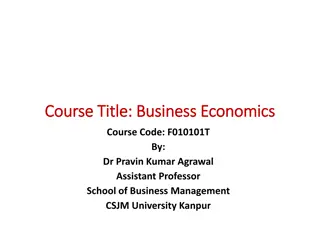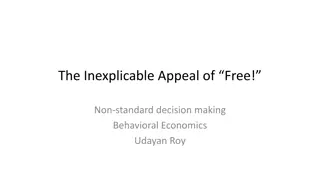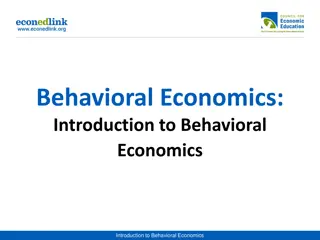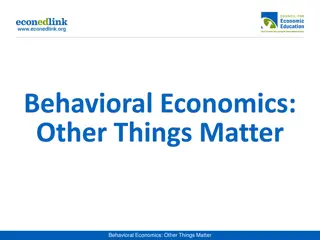Understanding Behavioral Economics in Business
Delve into the complexities of individual behavior, organizational dynamics, and institutional influences in the realm of business economics. Explore topics such as managing incentives, divisionalization, markets, and the societal role of firms. Discover how considerations of rationality, incentives, and societal responsibilities shape decision-making processes within organizations.
- Behavioral Economics
- Business Dynamics
- Organizational Behavior
- Institutional Influence
- Decision Making
Download Presentation

Please find below an Image/Link to download the presentation.
The content on the website is provided AS IS for your information and personal use only. It may not be sold, licensed, or shared on other websites without obtaining consent from the author. Download presentation by click this link. If you encounter any issues during the download, it is possible that the publisher has removed the file from their server.
E N D
Presentation Transcript
Contents 0. Kick-of sessions - Applying through real cases what was learnt in 4 trimesters - Identifying which additional tools we need to tackle them I. Individual behavior (opening the black box on individuals) 1. Role of rationality 2. Managing incentives II. Organization (the inside of firms) 3. Markets & organizations. Divisionalization 4. Markets & politics III. Institutions (the outside of firms) 5. Institutional support of private contracting 6. The role of firms in society, CSR
Contents 0. Kick-of sessions - Applying through real cases what was learnt in 4 trimesters - Identifying which additional tools we need to tackle them I. Individual behavior (opening the black box on individuals) 1. Role of rationality 2. Managing incentives II. Organization (the inside of firms) 4. Markets & organizations. Divisionalization 3. Markets & politics III. Institutions (the outside of firms) 5. Institutional support of private contracting 6. The role of firms in society, CSR
Outline: managing incentives is... Hard, even assuming homo economicus, eg: Agency & multitasking: e.g., quality vs. quantity Introduced in Business Economics: remember Kerr s Getting B When You Aimed for A Need to consider human nature (e.g., emotions) Readings in this topic: Fehr & Falk s survey of experiments Cowen s soft essay
Fehr & Falk 2002 Psychological Foundations of Incentives
Summary Economics based on a naive view of incentives: centered on effort and risk aversion Need to consider preferences for: Reciprocation Strong reciprocity, unrelated to expectation of future gains, as in direct or indirect (reputation-based) reciprocity Social approval Interesting work (will not be covered here)
I. Perspectives on reciprocity. Four experiments: 1. Source of voluntary cooperation Voluntary = not based on expectation of gains not cooperative or retaliatory (e.g., tit for tat strategy) 2. Explicit incentives vs. voluntary cooperation 3. Reciprocity as support for relational incentives 4. Incentives based on reciprocity and repetition
1. Reciprocity as a source of voluntary cooperation Anonymous strangers & without repetition Gift exchange experiment: Employer offers wage w (w = 0, 1, , 100) for a desired effort , which is not binding earns 100 e - w Employee freely chooses real e within (0.1, 0.2, ... , 1) at a cost c(e), between 0 & 18, increasing and convex earns rent w - c(e) What s the rational solution for homo economicus? Anticipating minimum effort, employer should offer minimum wage But, in fact, employers appeal to workers reciprocity
Fig. 1. Rent offered to workers and avg. desired & actual efforts (Fehr et al., 1997) Desired effort Real exerted effort = wage cost of effort
Analysis Remember: anonymity Reciprocity not caused by expectations of future gains Employers: Greater effort desired, greater wage offered, w greater rent w - c(e) Important check: employers offer less if e exogenous they re looking for reciprocity, not for sharing gains Employees: Greater rent offered greater real effort, e On average, they respond reciprocally But: Below desired level 40-60% of choose minimum effort Desired effort Real exerted effort = wage cost of effort
Applications of reciprocity-driven voluntary cooperation If employees have discretion, motivation cannot be based only on incentives Importance of Selection: (firing) & recruiting (un)cooperative types remember that 40-60% chose minimum effort Careful management of beliefs to induce cooperation Reciprocity could explain downward wage rigidity
2. Explicit incentives and voluntary cooperation Experiment with employers that contract using three alternative treatments: As before ( no incentive ) With wage deduction (fine) charged with probability 1/3 to shirkers ( negatively framed ) with self-interested workers, better (max)fine With bonus payment ( positively framed ), also paid with probability 1/3, thus producing the same compensation function as a fine
Fig. 2. The impact of explicit incentives on actual average effort (Fehr and G chter, 2000b).
Analysis When they could set fines Most (98.5%) did and chose the maximum (69%) Voluntary cooperation disappears ( crowding out ) Even when high rent offered Causes lower surplus, lower wages & higher employers profits Why does voluntary cooperation disappear? Introducing a fine is seen as and/or reveals distrust: contradiction between fine and generosity Logic from Evolutionary Psychology: type identification (?) Mathematically identical bonuses A bit worst than w/o incentives but small sign. effect Framing essential in incentives
3. Reciprocity as support for relational incentives Same experiment ( gift exchange , anonymous, no repetition) but employer observes real effort and Can reward (punish) higher (lower) effort, spending up to 10 so that each 1 spent in reward / punishment generates 2.5 for the employee
Results Although it is irrational to reward or punish, most do: If e < 68% punish, with 7 on average If e > 70% reward, with 7 on average If e = 41% reward, with 4,5 on average Employees anticipate reciprocity (54-98%) raise effort (from 0,37 to 0,65 on average); and adjust real to requested effort Net surplus increases 40%, despite expenditure in punishment Application: Contracting without verifiability by 3rd parties (judges) implicit contracting with 2ndparty relational enforcement Viable with mandatory 3rd party enforcement?
How do you explain these differences? Please, use insights from this topic, but also two basic some concepts studied in Business Economics. You may see a description and discussion in this paper. er 04
II. Social approval Social approval and disapproval modify conduct, not only because they generate future benefits but because they trigger emotions Experiment Each one of 10 strangers contributes x to a common pool, the pool is doubled and divided equally among the 10 the individual contributing 1 loses 0.2 Two cases, depending on contributions being: Anonymous they contribute 34% of endowment Public idem 68%
Reciprocity in public goods Individuals contribute money to a common pool, expecting an equal share in a multiple of the pool People start contributing more but their contributions decay with time and approach zero at the end When contributors can punish free-riders even at a cost ( strong reciprocity ), they do it, motivating cooperation Depending on punishing circumstances, free riders lead incapable-to-retaliate contributors to free ride contributors willing to costly retaliate lead fee riders to contribute But also antisocial punishment : cheaters punish cooperators Key: the role of culture, in both firms and societies (next slides) Managerial applications Manage expectations Select loyals Dismiss free riders
Social and antisocial punishment in different cultures Two public-good experiments with and without costly punishment N-condition P-condition Without With (left) (right)
Social and antisocial punishment in different cultures
Spain, intermediate results: like Italy, better than Greece, worst than, e.g., SWZ (prelim., Arechar 2013)
Kinship traits that characterize WEIRD societies % of 1,200 pre- industrial societies bilateral descent (relatedness traced through both parents) little or no cousin marriage monogamous marriage only nuclear family households neolocal residence (new couples set up a separate household) 28% 15% 25% 8% 5%
WEIRD hypothesis on 1st round contributions, no punishment WEIRD = Western, Educated, Industrialized, Rich, and Democratic Source: Henrich, J., The WEIRDest People in the World, 2020
The WEIRD hypothesis with punishment WEIRD = Western, Educated, Industrialized, Rich, and Democratic Source: Henrich, J., The WEIRDest People in the World, 2020
Possible explanation based on how societies sustain social norms through punishment (Henrich 2020: 221-ff) Kin-based societies Norm-violators are punished by relatives or traditional authorities to preserve the clan s collective reputation Strangers not allowed to punish In the experiment: low contributors end up retaliating against high contributors presumed to have been punishing them Societies with weak kinship Strangers can punish, no retaliation, good equilibrium But cross-cultural diffs. hotly debated: e.g., skim metanalyses: Th ny 18 & Spadaro et al. 22
II. Social approval Social approval and disapproval modifies conduct, not only because it generates future benefits but because it triggers emotions Experiment Each one of 10 strangers contributes x to a common pool, the pool is doubled and divided equally among the 10 the individual contributing 1 loses 0.2 Two cases, depending on contributions being: Anonymous they contribute 34% of endowment Public idem 68% Social approval incentives increase with average contribution Multiple equilibriums (Fig. 6)
Fig. 6. Multiple equilibriums in the presence of social approval Shock C A caused by an exogenous shock to the reaction function Unstable equilibrium B Stable and good equilibrium, C Stable but bad equilibrium, A
Fig. 6. Multiple equilibriums in the presence of social approval Shock C A caused by an exogenous shock to the reaction function How do we jump from bad equilibrium A to good eq. C?
Incentives and social norms Ex.: pricing delay in a kindergarten (Gneezy & Rustichini, 2000a) Problem: parents picked up their children late, violating a rule New policy announced: delays longer than 10 minutes over the official closing time will be fined, with the fine added to the monthly bill What consequences should be expected... ... from the new fining policy? ... from suppressing the policy two months later?
Consequences: Without fines Few delays (8 per week) After the new fining policy ($3) starts at week 4 Number of delays remains constant in weeks 5 and 6 Number of delays increases after week 7 (about 20 per week) After suppressing the fining policy in week 16 Delays remained constant at a level double the initial one Interpretation Were fines too low? ($3 per delay in a total monthly fee of $380) A morally ambiguous message suppressed the social norm and generated a market transaction? In terms of Fig. 6, parents moved from C to A and then to A Examples parking fines not collected in some cities? your experience with norms on smoking, exam cheating, etc.?
Social norms & formal rules Cultural explanations are useless. E.g., we Spaniards nowdrive much more slowly Was there info asymmetry on speeding? Sustainability Adapted: Catholic measures (ex ante control of all drivers) Do institutions (formal rules) produce our culture? Long run: e.g., the Reformation as institutional change Social norms constrain successful institutional change Is this important for institutional transplants ? Danish labor flexicurity ? Finish schools?
Spanish values (norms) as compared to those in main EU countries Responsibility We value less how democracy works, politicians & institutions; but we are also the less informed Only country in EU where citizens blame more Northern than Southern Europe for the economic crisis Social preferences With Italy, country with strongest / weakest belief that the State / the individual should have primary responsibility for ensuring a decent level of life Least support for the market economy Source: Study on World Values, FBBVA, 2013, 2019
What do we think of someone who avoids paying taxes? does not return a wallet containing money? dodges paying for a ticket on the Metro? steals someone else s Metro season ticket? slips a friend in for hospital tests? works while collecting unemployment benefits? keeps a commission for organizing a graduation party? keeps some of the money collected for a graduation trip? often misses classes? copies in exams? problem sets? copies from you without permission? hides reserved book in the library stacks?
How does the market affect cooperation? Empirical evidence from cross-cultural experiments Voluntary cooperation (i.e., w.r.t. strangers) increases when subjects have been living in developed societies versus tribal (hunter-gathering) societies Example: making and accepting unequal offers in ultimatum game depends on internalized social norms Why is voluntary cooperation lower for students and people below about 25 years old? Why is cooperation lower the more time subjects have to think? See, for a summary, e.g., Henrich (2016)
Cowen 2007, Ch. 2 How to Control the World: The Basics
Four rules Offer monetary rewards when performance highly responsive to effort Mechanical, simple work. Cold water experiment weak intrinsic motivation (e.g., garbage collection) Paying for grades in school for which students? next Importance of subj. discount rate for managing incentives receiving money produces social approval E.g., teenager as cashier vs. doing dishes at home To discuss: stigma (disapproval) for unemployment benefits High rewards tend to make individuals choke Fear to error or excuse? Millenials denial of career prospects?
Three parables Doing the dishes Should parents pay children to wash dishes? Car salesman Correspondence between effort and results Is this work fun? UN parking tickets UN representatives in NYC parking violations Social approval, meritocracy varies across environments Social norms We are environmentally cooperative: e.g., Kuwait hospitality vs. Norway s 25% absenteeism Do you speed? Anywhere? Have you ever cheated?
The WEIRD hypothesis on UN parking tickets WEIRD = Western, Educated, Industrialized, Rich, and Democratic Source: Henrich, J., The WEIRDest People in the World, 2020
How have your brothers & sisters being trained to face their professional career? Some illustrations and examples
Is it justified the recurrent criticism of millennials as narcissists? Millennial: a person reaching young adulthood in the early 21st century Narcissist: a person with excessive interest in or admiration of oneself
A couple of examples 2007 CTBP project definition: How graduates must adapt their emotional intelligence to succeed in their first jobs Students counter proposal: How employers must modify the jobs they offer to suit the new demands of young graduates 2017 discussion question: Build a list of biases that graduates have to manage to develop a successful professional career Bias found: Age Bias: older managers see young graduates as unqualified because they are young
Excessive risk aversion? E.g., students fear being unable to answer sharp EO&M/EI&M exam questions They d be happy w. responding it depends Final exam is not risky because It counts for 50% of the total grade It contains at least 30 questions; therefore, there is plenty of diversification Some degree of ambiguity is inevitable, but it s Much less than in real life: therefore, get accustomed It s the same for all students. Thus, mostly irrelevant for individual grades
